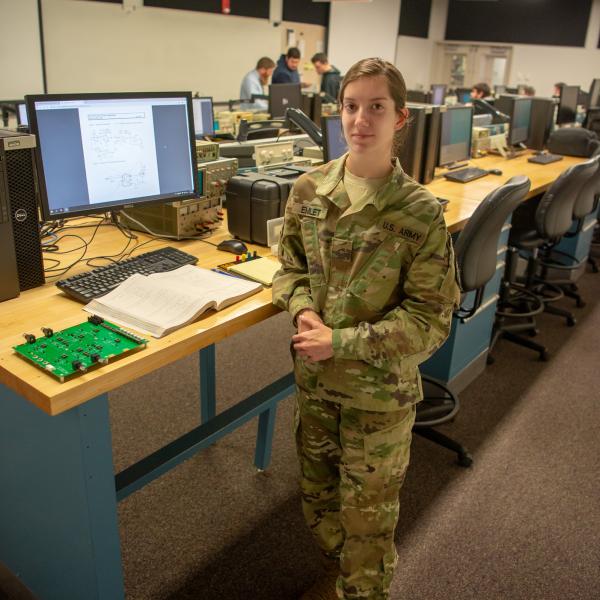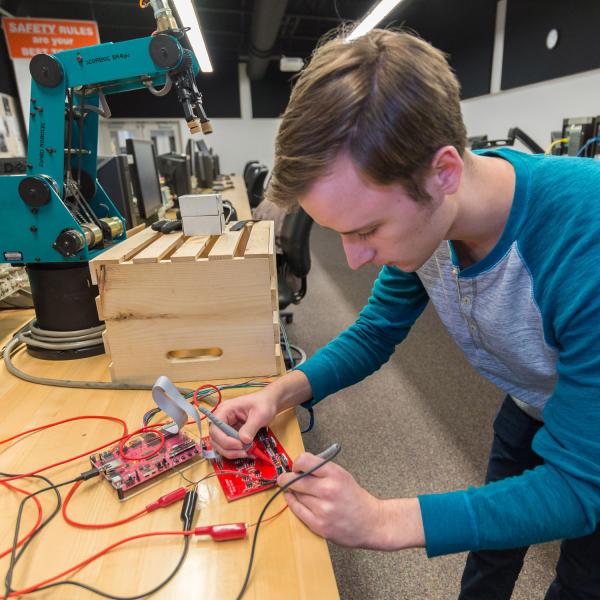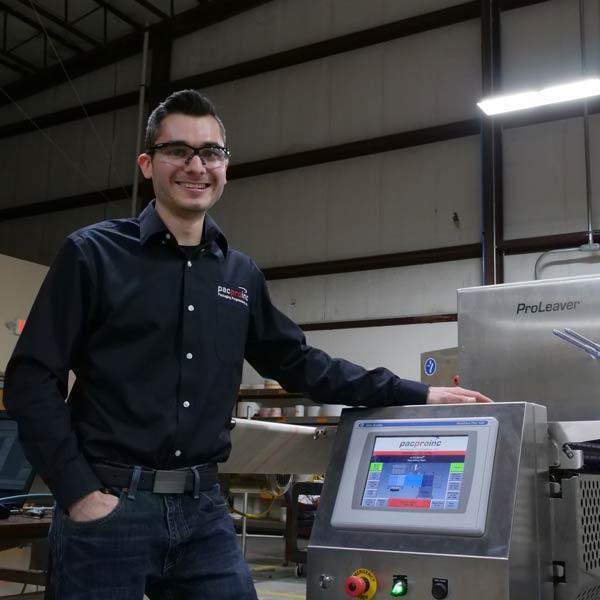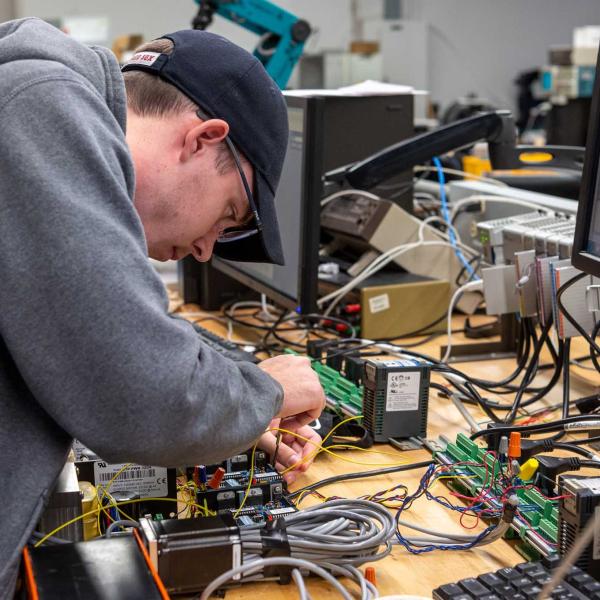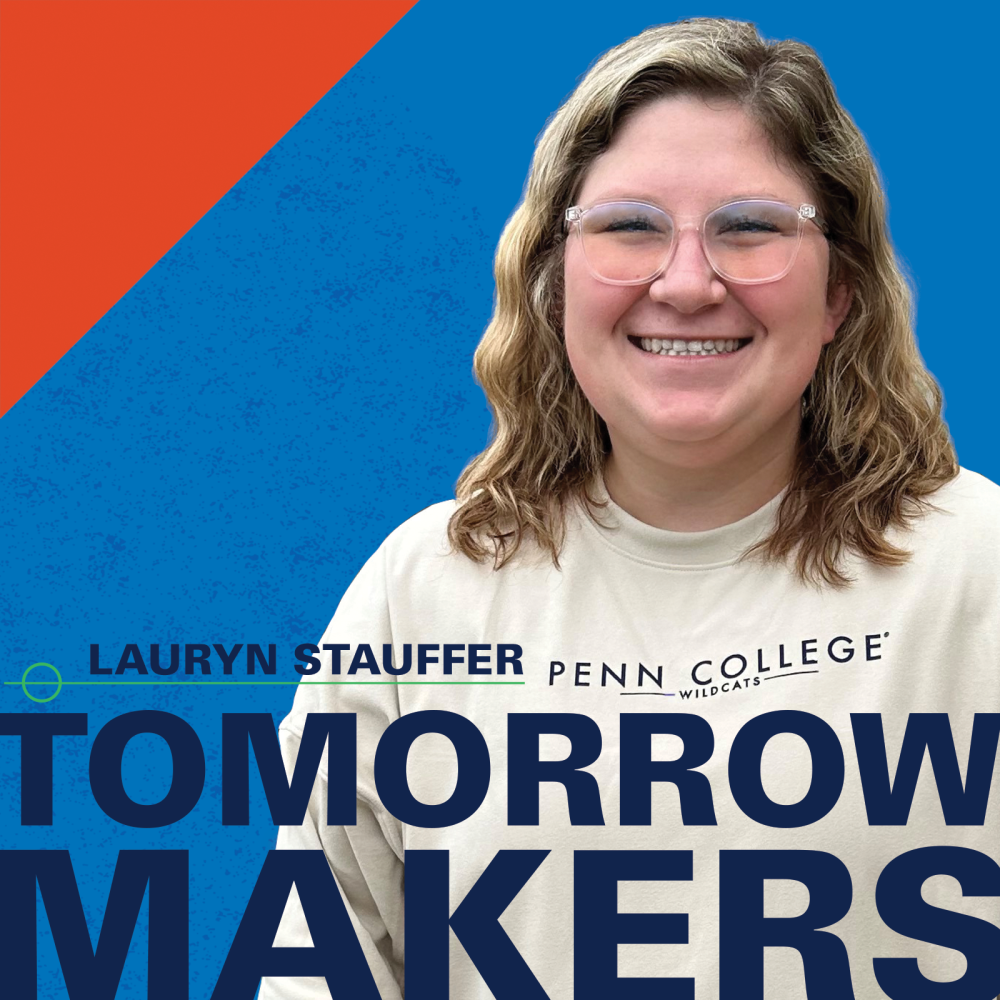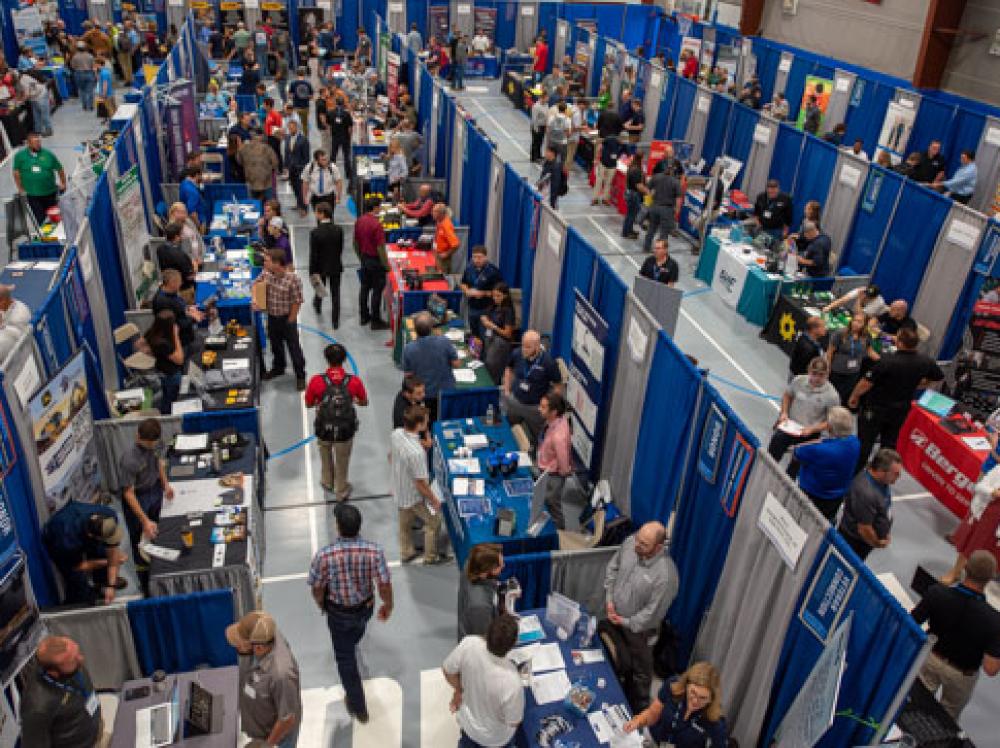Electronics & Computer Engineering Technology
About this program
When you set your mind to something, you make it happen. Working hard to find a solution, you test and tinker. Chase possibilities and arrive at sound solutions. In this ABET-accredited program, you’ll hone these talents and develop the skills to become a leader in the dynamic field of electronics and computer engineering. Learn industry standards. Apply circuit design principles. Analyze sophisticated networks. And take the lead to manage projects from kickoff to completion.
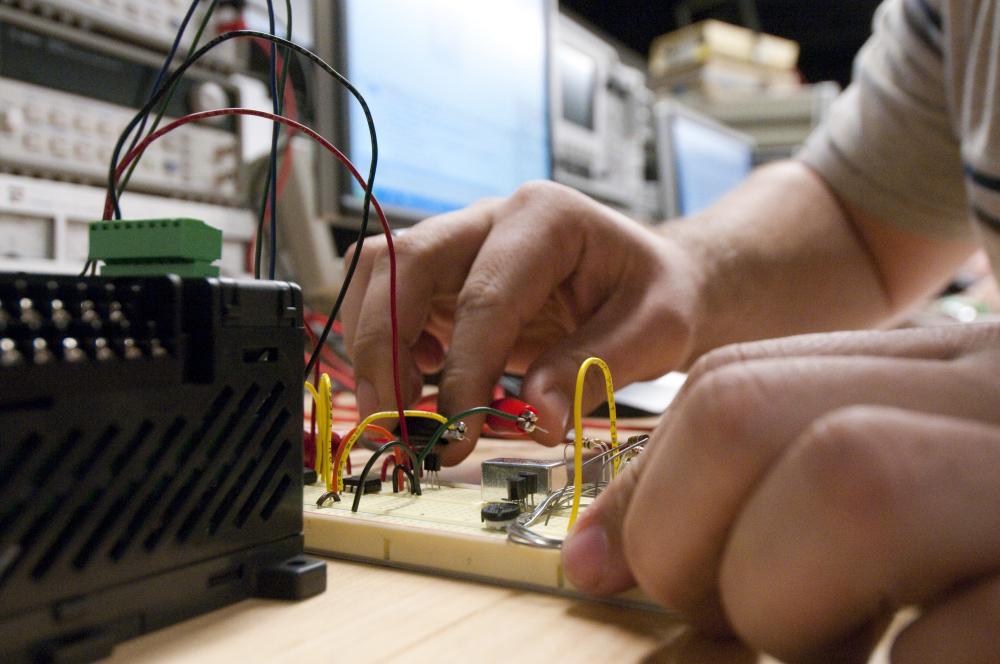
Careers
- Process engineer/technologist
- Test engineer/technologist
- Controls engineer/technologist
Courses
At Penn College, we believe your educational experience should go beyond specialized skills. Real-world ready means taking a broader approach that builds communication skills, inspires collaboration, and encourages exploration of arts, history, and science.
Specialization requires in-depth knowledge and high-level proficiency. Students learn and apply major-specific concepts, skills, and methods.
- Introduction to Digital Electronics (EET114)
- Digital Circuits Applications (EET115)
- Electronic Circuits & Devices I (EET116)
- Engineering, Technology & Society (EET124)
- Introduction to Microprocessors (EET154)
- Microprocessor Applications I (EET155)
- Electronic Circuits & Devices II (EET156)
- Software Tools for the Engineering Technologist (EET158)
- Network Installation & Maintenance (EET204)
- Network Maintenance Laboratory (EET205)
- Linear Integrated Circuits (EET206)
- Linear Circuits Applications (EET207)
- Systems Troubleshooting Applications (EET209)
- Microprocessor Interfacing (EET202)
- Microprocessor Applications II (EET203)
- Digital Systems (EET304)
- Digital Systems Lab (EET305)
- Electronic Prototyping & Design (EET324)
- Electronic Prototyping & Design Lab (EET325)
- Computer Solutions of Engineering Problems (EET311)
- Analog Systems (EET300)
- Analog Systems Lab (EET301)
- Measurement & Tests (EET320)
- Measurement & Tests Lab (EET321)
- Engineering Ethics & Legal Issues (MET321)
- Control Theory (EET340)
- Digital Signal Processing (EET400)
- Digital Signal Processing Lab (EET401)
- Senior Project Design (EET494)
- Senior Project Implementation (EET496)
- Engineering Economics (MET315)
- Directed Technology/Math/Science Elective (BEE)
Perspectives are points of view, offering a variety of ways of understanding, interacting, and influencing the world. Students identify, explain, and utilize the approaches used by academics and professionals to study, analyze, or understand problems, and offer solutions.
Next steps...
You're on your way to becoming a tomorrow maker.
Featured Video
Guaranteed Momentum at QorTek, Inc.
Creating aerospace and electronics components for the United States’ Department of Defense is a tall order. Thanks to their innovative approach and talented team, QorTek, Inc. has become a world leader doing exactly that. In this video, you’ll get a glimpse of their facility, learn about the organization’s mission, and meet the Penn College graduates who are pushing the needle forward in their field.
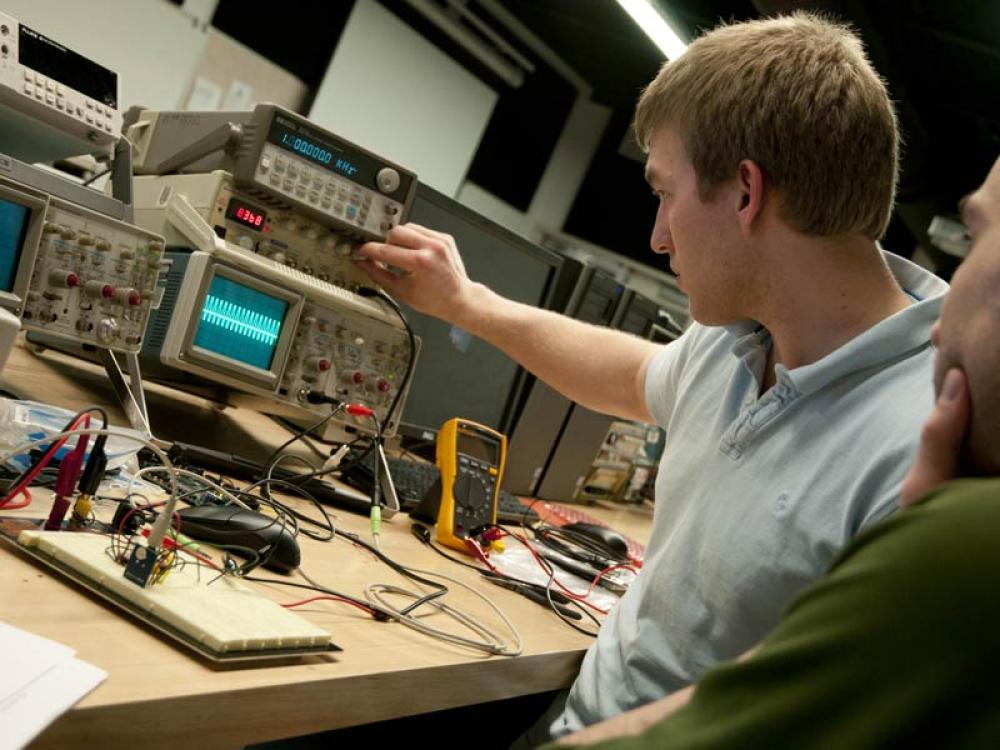
Facilities
Electronics Lab
Get hands-on experience in specialized labs using industry-standard equipment, embedded controller boards, and other tools just like you'll see in the real world.
Always Learning
Electronics overlaps areas of IT and electrical. Not sure which one might be right for you? Take a look at the similarities and differences below.
Electronics vs. IT
Electronics and IT overlap in software and networking skills, but they’re also very different. IT is the software/people side, while electronics is the hardware/machine side of computing.
Electronics
As an electronic student you’ll learn how to design, implement, and troubleshoot software and hardware (sensors, microprocessors, and output devices.) You’ll also learn how to write software to work with hardware to control electronic equipment, and how to troubleshoot PLCs (Programmable Logic Controllers) and the equipment connected to them.
IT
As an IT student you’ll learn how to work mostly with traditional computers to develop software applications used by individuals and businesses, cybersecurity, connecting computers (networking), and technical support.
Electronics vs. Electrical
Areas of overlap in electronics and electrical include programming and troubleshooting of automation systems, such as PLC software and hardware. Electronics work more in the initial programming and engineering areas whereas electrical positions usually involve more hands-on work as a technician.
Electronics
Electronics students experience lower voltage systems, and typically encounter voltages less than 120V in their work environment. Electronics involves microprocessor-based controllers and PLC programming.
Electrical
Electrical students are involved in the installation, commissioning, maintenance, and troubleshooting of residential/commercial/industrial systems, motor control & drives, PLCs, and basic electronics.
Maker Profiles
Tour Schedule
Seeing is believing.
Think Penn College might be a good fit for you? Make plans to visit and discover what hands-on learning is all about.
ABET-Accredited Program
Accredited by the Engineering Technology Accreditation Commission of ABET (www.abet.org ), under the General Criteria and the Program Criteria for Computer Engineering Technology and Similarly Named Programs and the Program Criteria for Electrical/Electronic(s) Engineering Technology and Similarly Named Programs.
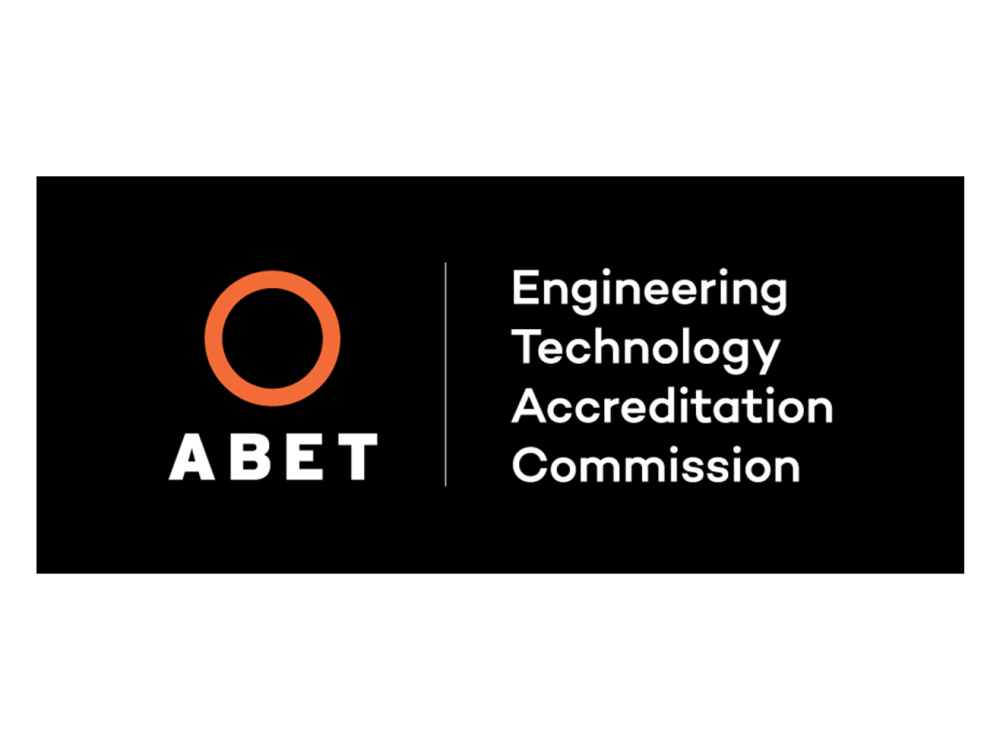
Internship
Your knowledge in practice
Internships are key for career preparation. Apply your know-how in the workplace and learn about the industry first-hand.

Related Programs
Follow your passion
Student Life
Lead and put your skills to the test
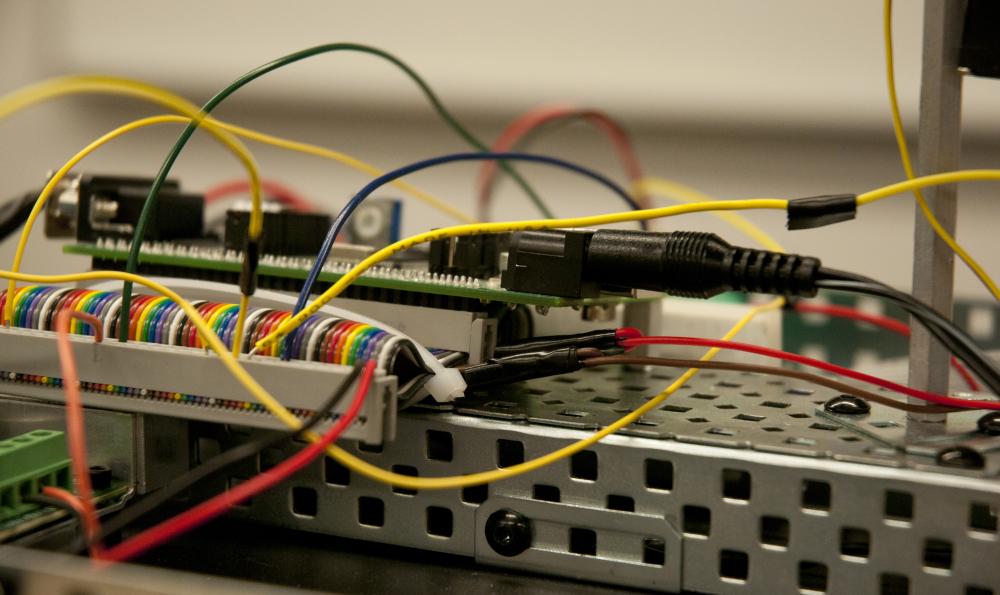
IEEE Student Branch at Penn College
Dedicated to advancing technological innovation and excellence for the benefit of humanity, the Penn College IEEE Student Branch meets regularly to work on professional soft skills, projects, and leadership.

SkillsUSA Champions at Work
Participation in SkillsUSA gives students a chance to compete in more than 80 national competitions.

Student Organizations at Penn College
Your college experience is about more than the classroom. Join one of 65+ clubs and organizations, or create your own.
Penn College News
Wednesday, February 5, 2025
TC Energy Corp. awards grant to Penn College
Tuesday, October 22, 2024
Passing the torch on 'Her Perfect Pathway'
Friday, May 24, 2024
Spring flashback: Northern Ireland visitors are a highlight
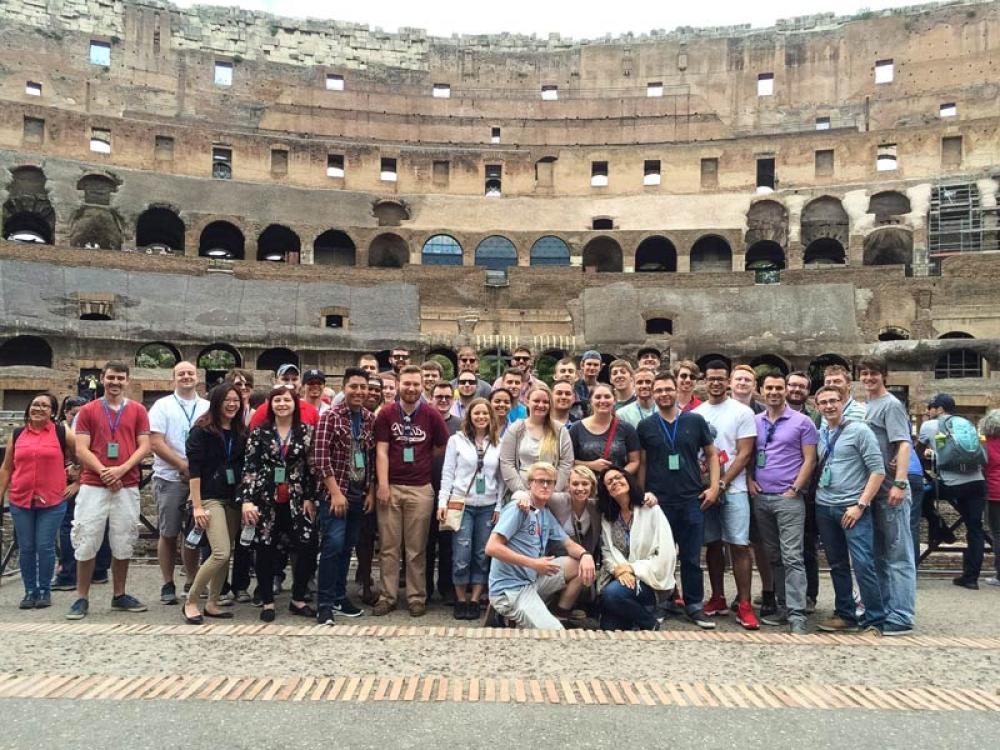
Study Abroad
Gain global experience
See the world via Williamsport. Take your education abroad and get hands-on experience learning about your industry on a global scale.
Student Experience
The community as their classroom
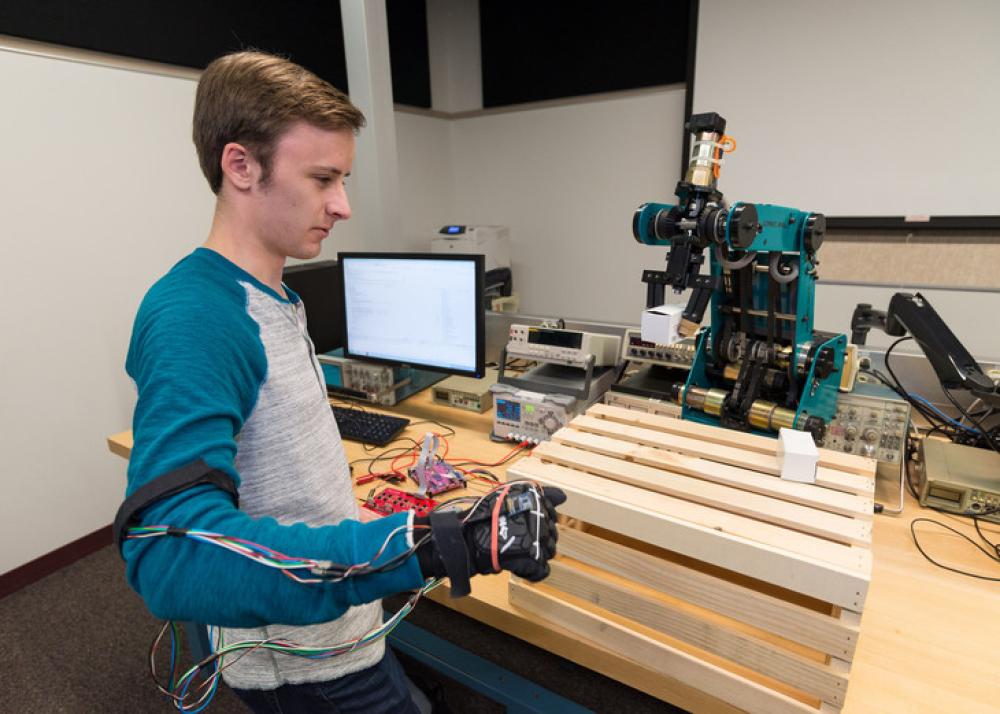
Student gives life to robot
More Information
Accredited by the Engineering Technology Accreditation Commission of ABET (www.abet.org ), under the General Criteria and the Program Criteria for Computer Engineering Technology and Similarly Named Programs and the Program Criteria for Electrical/Electronic(s) Engineering Technology and Similarly Named Programs.
This four-year degree major allows transfer from associate-degree majors in electrical/electronics/computer engineering technology from other institutions, as well as those offered by Penn College. This major is subject to the transfer standards established by the College (see http://www.pct.edu/admissions/transfer/Transferring-Credits). Exceptions must be approved the school dean.
Students are advised not to purchase new tools before meeting with faculty on the first day of classes.
It is suggested that students have at least the recommended tools. Instructors will help identify what tools are needed during the first day of class. Free lockers are located in the laboratory area.
View the Electronics & Computer Engineering Technology Tools .
Uniforms and tools are available for purchase through The College Store .
Electronics & Computer Engineering Technology Program Review Executive Summary
Cadence University Program Member
Cadence products presently used at Penn College. Read More
Alternative Credit refers to academic credits earned through means other than traditional college course completion, including: credit by exam, articulation, proof of competency gained in high school, work/life experience, and advanced placement.
Visit the Alternative Credit Options page for requirements and procedures and for information on credit through Advanced Placement.

